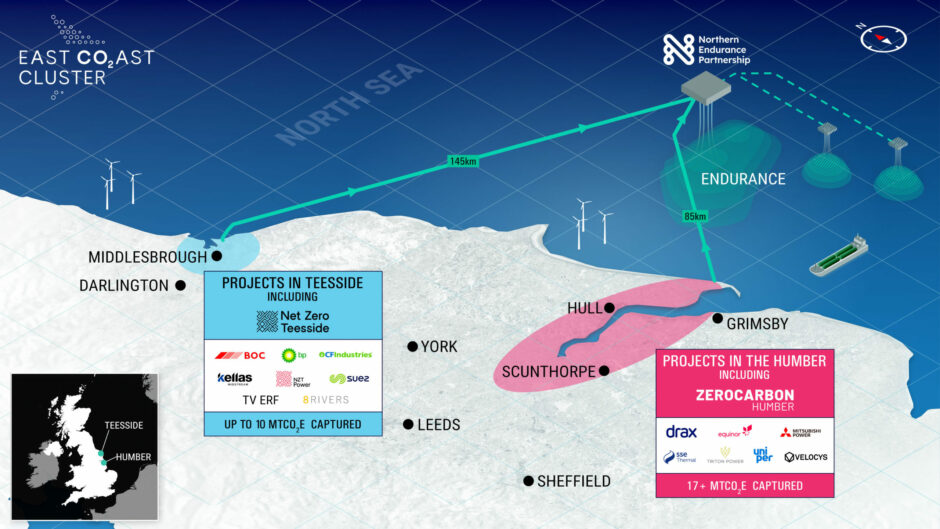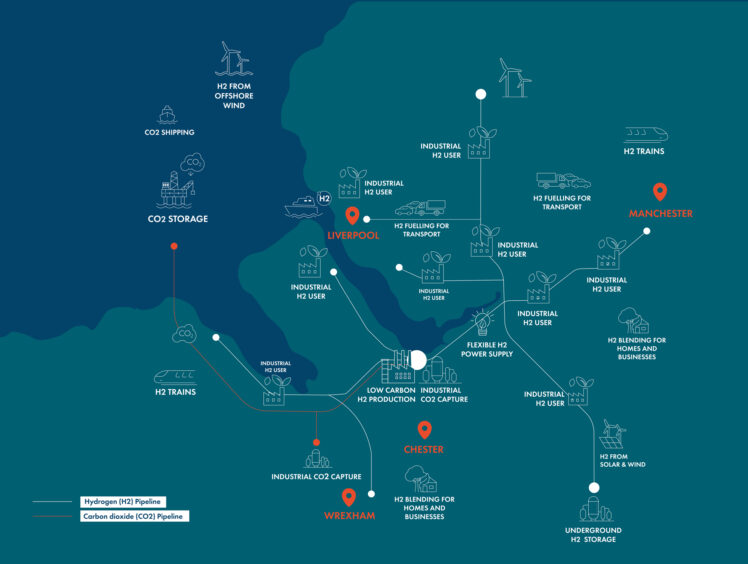
Amid disappointment for the Scottish cluster, two other projects have been successful in their bids to become the first two carbon capture utilisation and storage (CCUS) developments in the UK.
The East Coast Cluster and HyNet will take a share of a £1billion government investment pot to get up and running by the mid-2020s.
The East Coast Cluster, a project to decarbonise industrial emissions around the Humber and Teesside, has the potential to transport and securely store nearly 50% of all UK industrial cluster CO2 emissions – up to 27 million tonnes of CO2 emissions a year by 2030.
It is aimed at supporting 25,000 jobs per year between 2023 and 2050, with approximately 41,000 jobs at the project’s peak in 2026.
That bid was led on behalf of the ECC by the Northern Endurance Partnership, a group comprised of bp, Eni, Equinor, National Grid, Shell and TotalEnergies.
Louise Kingham, BP senior vice president, Europe and head of country, UK, said: “The East Coast Cluster can play a critical role in the UK Government’s levelling up ambition, supporting thousands of jobs and investing in local communities.
“Teesside and the Humber were once the industrial heart of the UK. Today’s announcement paves the way for them to become the green heart of the country’s energy transition, shepherding in the next generation of industry and ways of working.”
HyNet
HyNet, a project backed by Italian operator Eni, aims to remove industrial emissions from north-west England and north Wales.
Directors behind the project say it has the potential to reduce CO2 emissions by 10 million tonnes every year by 2030 – the equivalent of taking four million cars off the road.
Ged Barlow, CEO of Net Zero North West: “HyNet is vitally important not just to the decarbonisation of the North West but to the whole of the UK, so we wholeheartedly welcome the Government’s decision to back the project as a track 1 cluster.
“This announcement shows how the North West is uniquely positioned to help drive the UK’s transition to net zero. As our recent Net Zero North West manifesto made clear, we are not just talking about the opportunity we have a clear plan for how we can be the UK’s first net zero region. With an unrivalled mix of low carbon energy projects already happening we have all the ingredients to underpin a long term, resilient net zero energy system in the UK.”
Two other projects are expected to be selected by the UK Government in “Track 2”, to be up and running by 2030.
Ruth Herbert, chief Executive of the Carbon Capture and Storage Association, said: “The UK has today taken a significant step towards meeting its net zero target, by selecting the first projects that will start capturing and storing carbon dioxide in the mid-2020s. These first clusters will showcase the breadth of applications for CCUS; including industrial decarbonisation, clean hydrogen production and greenhouse gas removal – and will make a significant contribution to regional growth and levelling up in some of the UK’s key industrial heartlands.
“It is now absolutely critical that the industry has clarity over the long-term rollout of CCUS. If we are to achieve our climate goals, and the Climate Change Committee’s target of capturing 22 million tonnes of CO2 per year by 2030, the industry and wider supply chain need a clear line of sight to the future delivery of CCUS across the country. The CCSA looks forward to working with Government to bring forward the next phases of clusters.
“Ahead of next week’s Spending Review, we are calling for the Government to introduce a delivery plan for CCUS – setting annual spending budgets over the next decade to give the industry certainty to invest in projects now. As the UK prepares to host COP26 in November, we believe this commitment will send a strong signal that the UK is serious about meeting the Paris Agreement and becoming a global leader in this crucial planet-saving technology.”
Recommended for you


